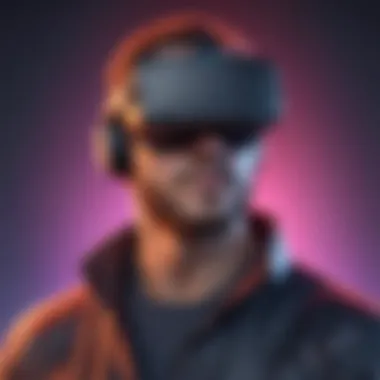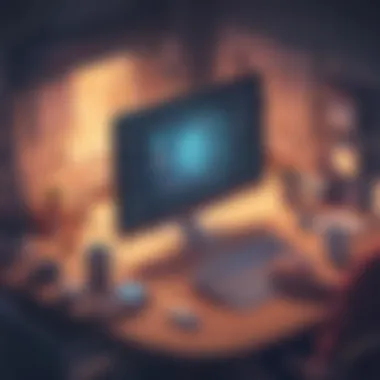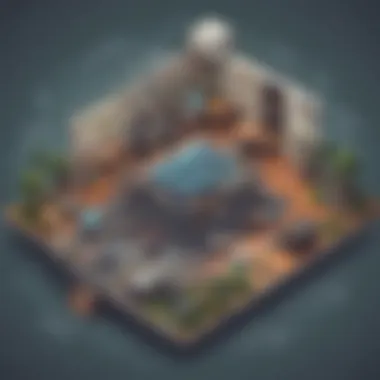Unlocking the Potential of Work from Home Game Design Opportunities


Tech Trend Analysis
In the realm of work from home game design jobs, the current tech trend analysis unveils a shift towards virtual collaboration tools and cloud-based game development platforms. This transformation is driven by the need for seamless remote working environments and efficient project management solutions. Consumers are increasingly demanding more immersive and interactive gaming experiences, which is pushing game designers to utilize cutting-edge technology and innovative design concepts. Looking ahead, the future predictions indicate a continued rise in the popularity of remote game design work, with possibilities for virtual reality integration and AI-driven gameplay enhancements.
Product Reviews
For individuals embarking on work from home game design jobs, understanding the key tools and software is crucial. An overview of industry-standard products like Unity, Unreal Engine, and Autodesk Maya is essential. These software packages offer a wide range of features and specifications, allowing game designers to create stunning visuals, compelling narratives, and engaging gameplay mechanics. Performance analysis of these tools showcases their capabilities in streamlining development processes and boosting productivity. While each product has its pros and cons, a recommendation for beginners would be to start with Unity for its user-friendly interface and robust community support.
How-To Guides
Introducing aspiring game designers to the topic of work from home opportunities entails guiding them through the essential steps and considerations. A step-by-step instruction manual on setting up a home office, creating a conducive work environment, honing game design skills, and networking with industry professionals is paramount. Offering tips and tricks on time management, creative ideation, prototyping techniques, and collaboration strategies can elevate the quality of output and facilitate career growth. Additionally, troubleshooting common issues related to remote work setups, software glitches, and creative blocks equips individuals with the resilience to overcome challenges and thrive in the dynamic field of game design.
Industry Updates
Amid the ever-evolving landscape of the tech industry, recent developments have unveiled new possibilities for game designers working from home. An analysis of market trends accentuates the growing demand for personalized gaming experiences, which opens avenues for independent game developers to create niche content tailored to specific audiences. This trend not only impacts businesses seeking to differentiate their offerings but also resonates with consumers looking for unique and innovative gaming experiences. Keeping abreast of these industry updates empowers game designers to adapt their strategies, explore new avenues for collaboration, and stay ahead of the curve in the competitive world of virtual entertainment.
Introduction
The realm of work from home game design jobs stands as a compelling domain in today's digital landscape. This article delves deep into the opportunities, requirements, and challenges that this field presents. It serves as a comprehensive guide for individuals aiming to venture into game design from the comfort of their homes.
Understanding Work from Home Game Design Jobs
Evolution of Remote Game Design


The evolution of remote game design has been significant in shaping the current landscape of the gaming industry. With advancements in technology and communication, game developers can now collaborate seamlessly from different parts of the world, breaking the geographical barriers that once constrained creativity. This aspect of remote game design offers unparalleled flexibility and efficiency in game development processes, making it a preferred choice for modern designers. Despite its advantages, remote game design may pose challenges in terms of team coordination and project management due to physical separation.
Impact of Technology on Virtual Game Development
The impact of technology on virtual game development cannot be understated in the context of work from home game design jobs. Technologies such as virtual reality (VR), augmented reality (AR), and cloud computing have revolutionized how games are conceptualized, developed, and experienced. These advancements enhance the immersive quality of games and allow for more innovative designs. However, integrating complex technologies into remote game development can require specialized skills and resources, posing a potential barrier for individual designers. Despite these challenges, embracing technology in game design opens up a world of possibilities for creating unique and engaging gaming experiences.
Benefits of Work from Home Game Design Jobs
Work from Home Game Design Jobs offer a plethora of advantages that cater to the needs of modern-day professionals. This section aims to delve into the pivotal aspects that make these roles highly sought after in the digital era. By highlighting the flexibility, work-life balance, and other key benefits associated with remote game design work, individuals can gain valuable insights into this evolving field. These benefits not only enhance the quality of work but also contribute to creating a conducive environment for creativity and innovation.
Flexibility and Work-Life Balance
Flexibility and work-life balance are integral components of remote game design jobs, playing a crucial role in shaping the overall work experience. Within this realm, the concept of a Customized Work Environment stands out as a defining feature that caters to individual preferences and requirements. By allowing professionals to personalize their work setup according to their comfort and needs, a Customized Work Environment fosters a sense of ownership and autonomy. This tailored approach empowers designers to maximize their productivity and creativity, thus heightening the quality of their work output. The advantages of a Customized Work Environment extend beyond mere convenience, paving the way for a more fulfilling and rewarding work experience.
Customized Work Environment
The concept of a Customized Work Environment revolutionizes the traditional work setting by offering personalized spaces tailored to individual preferences. This bespoke approach enables professionals to design their workstations in a manner that optimizes efficiency and comfort. Whether it involves choosing ergonomic furniture, setting up a dedicated gaming zone, or creating a minimalist workspace, the flexibility inherent in a Customized Work Environment allows game designers to craft an environment conducive to their creative process. Such customization not only enhances productivity but also contributes to overall job satisfaction and well-being. Despite its advantages, it is essential to note that maintaining a balance between comfort and functionality is paramount to ensure optimal performance in a remote game design setup.
Elimination of Commuting Hassles
The Elimination of Commuting Hassles is another significant advantage associated with work from home game design roles. By eradicating the need to commute to a physical office, professionals can save valuable time and resources that would otherwise be spent on transportation. This removal of commuting constraints not only reduces stress and fatigue but also allows individuals to allocate this saved time towards work or personal pursuits. Moreover, the elimination of commuting hassles contributes to a more environmentally friendly work approach, thereby aligning with sustainability goals. While virtual connectivity has bridged the gap between physical distances, the absence of daily commuting fosters a more efficient and sustainable work environment, making remote game design jobs a compelling choice for individuals seeking a well-rounded professional experience.
Requirements for Remote Game Design Work


In the context of examining work from home game design jobs, understanding the requirements for remote game design work is paramount. Remote game design work necessitates a specific set of competencies and conditions to thrive. Factors like technological proficiency, communication skills, and self-discipline play crucial roles in the success of remote game designers. Individuals engaging in remote game design work must possess a deep understanding of virtual collaboration tools, project management software, and game development engines. Moreover, they must excel in remote communication to effectively interact with team members and stakeholders. To excel in remote game design work, designers must also exhibit self-motivation, the ability to work independently, and time management skills. Embracing these requirements ensures optimal performance and productivity in the remote game design landscape.
Essential Skills for Success
Coding Proficiency
Coding proficiency stands as a foundational skill for success in remote game design work. A solid grasp of programming languages such as C++, Java, or Python enables game designers to translate their creative visions into functional, interactive gameplay experiences. Proficiency in coding empowers designers to manipulate game mechanics, implement complex algorithms, and troubleshoot technical issues effectively. This skill not only streamlines the game development process but also enhances the designer's ability to innovate and create unique gaming experiences. Coding proficiency is indispensable for remote game designers looking to thrive in a competitive industry driven by technological advancements and innovation.
Creative Problem-Solving Abilities
Creative problem-solving abilities play a vital role in ensuring success in remote game design work. Game designers often encounter intricate challenges during the development process, ranging from gameplay logic issues to design inconsistencies. Creative problem-solving skills equip designers to analyze complex problems, think outside the box, and devise innovative solutions. By leveraging creative problem-solving abilities, designers can address design hurdles efficiently, contribute novel ideas to game projects, and enhance the overall player experience. These skills not only foster ingenuity and critical thinking but also position remote game designers as valuable assets in the ever-evolving landscape of game development. Developing and honing creative problem-solving abilities is integral to navigating the demands and complexities of remote game design work.
Challenges Faced in Work from Home Game Design Jobs
In the expansive domain of work from home game design jobs, challenges are intrinsic, demanding thorough recognition and adept navigation to ensure optimal productivity and success. Understanding and addressing these challenges is pivotal in sculpting a conducive work environment and fostering professional growth. The significance of exploring the challenges in this sector lies in equipping individuals with the knowledge and strategies essential for overcoming obstacles and maximizing opportunities within remote game development.
Communication and Collaboration Hurdles
Team Synchronization
Team synchronization stands as a cornerstone in the realm of collaborative endeavors, emphasizing the harmonious alignment of diverse team members' efforts towards a unified goal. The intricate interplay of skills, perspectives, and timelines necessitates a structured approach to foster cohesion and streamline operations. Its value within the context of remote game design is profound, as it anchors seamless coordination among dispersed team members, bridging geographical gaps and ensuring a synchronized workflow. The unique feature of team synchronization lies in its ability to merge individual contributions into a collective masterpiece, capitalizing on diverse talents to achieve cohesive outcomes. Despite its efficiencies, challenges such as time zone variations and technological barriers may impede synchronization, highlighting the need for robust communication channels and strategic planning to sustain collaborative momentum.
Feedback Integration


Feedback integration is integral to refining creative endeavors, amplifying the iterative process of game development through continuous evaluation and enhancement. This aspect accentuates the incorporation of diverse feedback sources, ranging from team members to end-users, to refine and optimize game design elements. Its prominence in this article stems from its role in fostering iterative improvement and ensuring user-centric experiences in virtual gaming realms. The key characteristic of feedback integration lies in its capacity to catalyze innovation and address evolving market demands by iteratively shaping game features based on user insights. While advantageous in promoting user engagement and product relevance, challenges like managing conflicting feedback and gauging subjective opinions pose complexities in integrating feedback effectively. Navigating these challenges requires a structured feedback loop and a discerning approach to distill actionable insights, underlining the importance of a responsive feedback mechanism in remote game design environments.
Navigating the Remote Game Design Landscape
Navigating the Remote Game Design Landscape holds a pivotal role in providing aspiring game designers with a roadmap to thrive in the virtual work setting. This section sheds light on the various aspects and strategies individuals can employ to excel in remote game design. Understanding the nuances of remote work dynamics, networking avenues, and virtual collaboration platforms are essential for success in this field. By navigating this landscape effectively, professionals can harness opportunities, expand their horizons, and stay relevant in the ever-evolving game design industry.
Networking Opportunities in Virtual Spaces
Online Forums and Communities
Online Forums and Communities serve as digital hubs where game design enthusiasts converge to exchange ideas, seek advice, and foster connections within the industry. These platforms facilitate knowledge sharing, collaboration, and networking among remote game designers worldwide. The key characteristic of Online Forums and Communities lies in their ability to create a virtual space for professionals to engage in discussions, receive feedback, and stay updated on industry trends. Being an integral part of this article, Online Forums and Communities offer a valuable resource for individuals looking to enhance their skills, build a professional network, and stay abreast of the latest developments in game design. Despite some potential drawbacks like information overload or lack of moderation, these platforms remain a popular choice for remote game designers seeking community support and industry insights.
Virtual Conferences and Workshops
Virtual Conferences and Workshops play a significant role in connecting game design professionals from around the globe, offering opportunities for learning, networking, and showcasing expertise. These events bring together industry experts, emerging talents, and enthusiasts in a virtual environment conducive to knowledge exchange and skill development. A key feature of Virtual Conferences and Workshops is their ability to simulate real-world conference experiences through interactive sessions, keynote speeches, and networking opportunities. In the context of this article, Virtual Conferences and Workshops present a beneficial platform for remote game designers to engage with thought leaders, participate in skill-building workshops, and stay informed about industry innovations. While virtual events may pose challenges like technical glitches or limited interactivity, they continue to be a preferred choice for professionals seeking to expand their knowledge base and establish meaningful connections within the game design community.
Conclusion
Working in remote game design positions allows individuals to participate in the industry's evolution from the comfort of their own homes. The importance of this shift cannot be overstated. Embracing this flexible work model opens doors to diverse talent pools globally, fostering innovation and creativity. Remote game design not only offers a better work-life balance but also contributes to a healthier environment by eliminating commuting stresses. This shift towards remote work is not merely a trend; it is a fundamental reimagining of how the game design landscape operates, promising exciting opportunities for both seasoned professionals and newcomers to the field.
Embracing the Future of Work from Home Game Design
Innovations in Remote Game Development
Innovations in remote game development are reshaping the virtual world. The key characteristic of these innovations lies in their ability to streamline collaborative processes, allowing teams to work seamlessly across different time zones and geographies. Cloud-based tools and virtual reality technologies are revolutionizing how games are designed and developed, enhancing the overall user experience. This shift towards innovative practices not only accelerates production cycles but also cultivates a culture of creativity and experimentation within the industry. However, integrating these advanced technologies requires a deep understanding of the digital landscape and ongoing support to leverage their full potential.
Continuous Learning and Adaptation
Continuous learning and adaptation are essential for professionals navigating the dynamic realm of remote game design. The key characteristic of this approach is its emphasis on staying updated with industry trends, tools, and methodologies. Embracing a mindset of continuous learning enables game designers to remain progressive and relevant in a constantly evolving field. While the benefits of continuous learning are immense, including personal growth and enhanced job satisfaction, it also presents challenges such as information overload and skill gaps. Balancing the pursuit of new knowledge with practical application is crucial for professionals seeking long-term success in remote game design careers.



